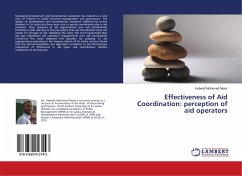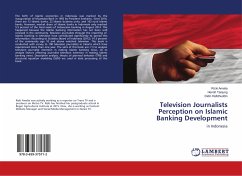Managing development and humanitarian assistance has evolved as a vital area of reforms in public financial management and governance. The impact of development and humanitarian assistance followed by recent disasters in Sri Lanka has been poor due to poorly coordinated play in aid provision. Poor response of aid organizations over aid coordination initiatives is inter alia due to the perception that aid coordination does not matter for all types of aid. Validating this claim, this work hypnotized that aid type determines aid operators' engagements over aid coordination initiatives. This book explored this question by studying 21 aid organizations operating in the Ampara district of Sri Lanka and has found that the aid harmonization and alignment contribute to aid effectiveness irrespective of differences in aid types. Aid coordination matters irrespective of aid diversity.
Bitte wählen Sie Ihr Anliegen aus.
Rechnungen
Retourenschein anfordern
Bestellstatus
Storno








